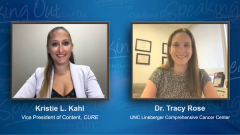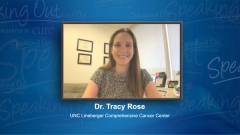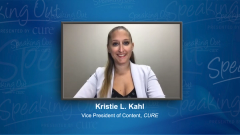
Having Open and Honest Conversations With Oncologists Aids in Patient-Physician Communication in Bladder Cancer
As part of its “Speaking Out” video series, CURE spoke with Dr. Tracy L. Rose, on behalf of the Bladder Cancer Advocacy Network, about letting physicians know about patient preferences to improve communication and select the right treatment option.
Kristie L. Kahl: To start, can you speak to why it is important for patients to be their own best advocate when it comes to their care?
Tracy L. Rose: So this is an incredibly important thing to discuss. I'm a medical oncologist, meaning that I help patients with cancer through some of the hardest times in their life. And despite having taken care of many, many, many patients, I never know when I meet someone exactly what their goals and dreams are in the coming months and times, and every patient is different. So, I think it's so important for patients and their family members to advocate for themselves, because they're really the only ones that know themselves and know what it is that they want out of treatment, how they want the interactions to go, what's important to them, the things they hate, the things they love. It's almost important to educate clinicians like myself in those things, so that we can really help people make the best decision. And so, sometimes we don't know what people want. And it's such an important part of care, that advocating for yourself is incredibly important.
Kahl: With that, what are some challenges that we see still with patient-physician communication?
Rose: Yeah, so I always tell my patients that our incentives are aligned, right? What I want out of taking care of patients is typically what they want, right? I want to give them whatever is important to them, but because I don't always know what that is, and they might not always realize that that's actually what I'm trying to go for as well, sometimes it can be challenging. A lot of patients are in really difficult situations, they don't feel well, sometimes they're angry at the situation, sometimes they're angry at things that have happened. Everybody's emotional about it. And all of that just makes communication more difficult. So, I think one of the most important things is just listening. I try to listen to patients. And I also try to encourage them to sort of listen and process and ask question after question, because I think sometimes, the other challenge we see is that (oncologists) explain something, but patients are not in a place where they can listen right then and there because I've given bad news or because there's a lot changing or for whatever reason. And so I think making sure that you're listening, either party in the relationship, and that the person you're talking to is able to listen. And if not, being patient, and encouraging people to ask questions, again, comes back to the patient advocacy. Just ask questions, however many times you need to until you feel like you understand. And I think some patients don't want to bother me. So the other thing I would say is that a challenge is sort of breaking down that and if people feel like they need care, need answers to really reach out.
Kahl: Why is it important for patients to talk about their preferences on treatment?
Rose: I think that's so important for the clinicians to really have an understanding of what the patient says. One of the most common questions I get asked is, “If I was your dad, what would you want for them?” And I always tell people, that's an easy question for me, because I know my dad so well. I know exactly what he would want in each situation because I know the things that he hates, and I know the things that would drive him nuts. So for my dad, it's so easy. But what I want to do with my patients is say, “I don't know that you would want the same thing because I don't know you as well. So, tell me about that. Tell me about you.” And I'll actually give examples about things that I know, people sometimes don't like: coming to the hospital, certain side effects, and also things that drive other people crazy, like staying up at night, wondering if they should have gone with the more aggressive treatment, for example. And everybody's different.
And so as we make treatment choices based on side effect profiles and potential detriment or improvement in quality of life, we really just have to know what is important to each person. If someone's an avid pickleball player, then the balance issues that can come with neuropathy may be much worse than if someone has eye problems, and another drug might be more likely to cause eye issues, etc. (It’s) not only the medical things, but also social and emotional things play into what treatments we pick, too.
Kahl: How does seeking a second opinion play into the role of patient-physician communication?
Rose: So I always tell patients you have to feel good about your team, and you have to feel good about your plan. And sometimes no matter how good the doctor or the relationship is, sometimes that just requires hearing from somebody else, that that's a right plan. I think that there's also other reasons to get second opinions. For example, with clinical trials: (not all) cancer centers (offer) all of the clinical trials. So sometimes there's other good reasons to get second opinions.
I think first and foremost, it just helps to hear from another perspective, to hear that the plan is a good one. And then, feeling like you really trust and feel good about what you're doing because I think the most important thing is that you feel good about the plan and the plan fits you. I always encourage people to get other opinions and hear from other people until they get there.
I think a lot of patients are shy to ask for referrals for second opinions. And it's very hard sometimes to know who to go see as a second opinion. So sometimes, actually, the person that you're seeing is one of the best people to help you figure out who the expert, who the other experts are in the field, right. And so, I think if you have a provider or a clinician that won't help you find a second opinion, maybe that's not someone that you want to be seeing. And so I think the vast majority of us are happy to arrange it and help patients. And so I really encourage, and I think it's great, just to give people the confidence that they need to move forward.
Kahl: To bring this all together, what would you say is your biggest piece of advice to help improve a patient’s communication with their physician?
Rose: If something is bothering you or if you have questions, just type them. No one will know what it is that is so important to you, unless you tell people. Tell them until you feel like you've been heard. And, and I think that also goes both ways to listen, but also being open, being honest, sending communication until you feel good about the plan and the answer, and really feeling like you're in a good place and in your treatment plan.
Transcription edited for clarity and conciseness.








